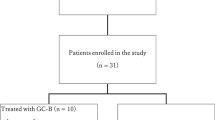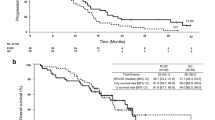Abstract
Introduction
Platinum resistant ovarian cancer is a current challenge in Oncology. Current approved therapies offer no more of a 20% of response. New therapeutic options are urgently needed.
Patients and Methods
Patients were treated with the combination of Pemetrexed 500 mg/m2 d1 and Gemcitabine 1000 mg/m2 d1, 8 in a 21 days basis.
Results
10 platinum-resistant ovarian cancer patients were treated under compassionate use. Mean previous chemotherapy lines were 3.3. Mean administered cycles were 4. Mean CA 125 decrease was on average of 47%, with one patient experiencing a 95% decrease in her CA 125 level. 1 patient had a complete clinical remission, and 2, had partial radiological responses. Mean Progression free survival was 16.5 weeks, and Overall Survival was 21.2 weeks. Treatment was well tolerated.
Conclusions
Deemd to the observed activity, the combination of Pemetrexed and Gemcitabine deserves deeper investigation in platinum-resistant ovarian cancer patients.
Similar content being viewed by others
References
Jemal A, Siegel R, Ward E et al (2007) Cancer statistics, 2007. CA Cancer J Clin 57:43–66
Markman M, Markman J, Webster K et al (2004) Duration of response to second-line, platinumbased chemotherapy for ovarian cancer: implications for patient management and clinical trial design. J Clin Oncol 22:3120
Slayton RE, Creasman WT, Petty W et al (1979) Phase II trial of VP-16-213 in the treatment of advanced squamous cell carcinoma of the cervix and adenocarcinoma of the ovary: a Gynecologic Oncology Group Study. Cancer Treat Rep 63:2089
Rose PG, Blessing JA, Mayer AR, Homesley HD (1998) Prolonged oral etoposide as second-line therapy for platinum-resistant and platinum-sensitive ovarian carcinoma: a Gynecologic Oncology Group study. J Clin Oncol 16:405
Muggia FM, Hainsworth JD, Jeffers S et al (1997) Phase II study of liposomal doxorubicin in refractory ovarian cancer: antitumor activity and toxicity modification by liposomal encapsulation. J Clin Oncol 15:987
Gordon AN, Fleagle JT, Guthrie D et al (2001) Recurrent epithelial ovarian carcinoma: a randomized phase III study of pegylated liposomal doxorubicin versus topotecan. J Clin Oncol 19:3312
Clarke-Pearson DL, Van Le L, Iveson T et al (2001) Oral topotecan as single-agent second-line chemotherapy in patients with advanced ovarian cancer. J Clin Oncol 19:3967
Hochster H, Wadler S, Runowicz C et al (1999) Activity and pharmacodynamics of 21-Day topotecan infusion in patients with ovarian cancer previously treated with platinum-based chemotherapy. New York Gynecologic Oncology Group. J Clin Oncol 17:2553
Friedlander M, Millward MJ, Bell D et al (1998) A phase II study of gemcitabine in platinum pretreated patients with advanced epithelial ovarian cancer. Ann Oncol 9:1343
Lund B, Hansen OP, Theilade K et al (1994) Phase II study of gemcitabine (2′,2′-difluorodeoxycytidine) in previously treated ovarian cancer patients. J Natl Cancer Inst 86:1530
Sorensen P, Hoyer M, Jakobsen A et al (2001) Phase II study of vinorelbine in the treatment of platinum-resistant ovarian carcinoma. Gynecol Oncol 81:58
Rothenberg ML, Liu PY, Nahhas WA et al (1999) A phase II trial of vinorelbine in relapsed and refractory ovarian cancer. A Southwest Oncology Group study (SWOG-9324) (abstract). Proc Am Soc Clin Oncol 18:383a
Markman M, Kennedy A, Sutton G et al (1998) Phase 2 trial of single agent ifosfamide/mesna in patients with platinum/paclitaxel refractory ovarian cancer who have not previously been treated with an alkylating agent. Gynecol Oncol 70:272
Baur M, Fazeny-Doerner B, Hudec M et al (2006) Ifosfamide/mesna as salvage therapy in platinum pretreated ovarian cancer patients — long-term results of a phase II study. Cancer Invest 24:22
Look KY, Muss HB, Blessing JA, Morris M (1995) A phase II trial of 5-fluorouracil and highdose leucovorin in recurrent epithelial ovarian car cinoma. A Gynecologic Oncology Group Study. Am J Clin Oncol 18:19
Williams CJ (2001) Tamoxifen for relapse of ovarian cancer (Cochrane Review). Cochrane Database Syst Rev 1:CD001034
Markman M, Iseminger KA, Hatch KD et al (1996) Tamoxifen in platinum-refractory ovarian cancer: a Gynecologic Oncology Group Ancillary Report. Gynecol Oncol 62:4
Smyth JF, Gourley C, Walker G et al (2007) Antiestrogen therapy is active in selected ovarian cancer cases: the use of letrozole in estrogen receptor-positive patients. Clin Cancer Res 13:3617
Burger RA, Sill MW, Monk BJ et al (2007) Phase II trial of bevacizumab in persistent or recurrent epithelial ovarian cancer or primary peritoneal cancer: a Gynecologic Oncology Group Study. J Clin Oncol 25:5165
Cannistra SA, Matulonis UA, Penson RT et al (2007) Phase II study of bevacizumab in patients with platinum-resistant ovarian cancer or peritoneal serous cancer. J Clin Oncol 25:5180
Chura JC, Van Iseghem K, Downs LS Jr et al (2007) Bevacizumab plus cyclophosphamide in heavily pretreated patients with recurrent ovarian cancer. Gynecol Oncol 107:326
Wright JD, Hagemann A, Rader JS et al (2006) Bevacizumab combination therapy in recurrent, platinum-refractory, epithelial ovarian carcinoma: a retrospective analysis. Cancer 107:83
Han ES, Monk BJ (2007) What is the risk of bowel perforation associated with bevacizumab therapy in ovarian cancer? Gynecol Oncol 105:3
Lordick F, Geinitz H, Theisen J et al (2006) Increased risk of ischemic bowel complications during treatment with bevacizumab after pelvic irradiation: report of three cases. Int J Radiat Oncol Biol Phys 64:1295
Shih C, Chen VJ, Gossett LS, et al (1997) LY231514, a pyrrolo [2,3-d]pyrimidine-based antifolate that inhibits multiple folate requiring enzymes. Cancer Res 57:1116–1123
Zhao R, Babani S, Gao F et al (2000) The mechanism of transport of the multitargeted antifolate MTA-LY231514, and its cross-resistance pattern in cell with impaired transport of methotrexed. Clin Cancer Res 6: 3687–3695
Shepherd FA, Dancey J, Arnold A et al (2001) Phase II study of pemetrexed disodium, a multitargeted antifolate, and cisplatin as first-line therapy in patients with advanced non-small cell lung carcinoma: a study of the National Cancer Institute of Canada Clinical Trials Group. Cancer 92: 595–600
Dean-Colomb W, Esteva FJ (2008) Emerging agents in the treatment of anthracycline- and taxane-refractory metastatic breast cancer. Semin Oncol 35[2 Suppl 2]:S31–S38; quiz S40
Galsky MD, Mironov S, Iasonos A et al (2007) Phase II trial of pemetrexed as second-line therapy in patients with metastatic urothelial carcinoma. Invest New Drugs 25:265–270
Paz-Ares L, Ciruelos E, García-Carbonero R et al (2002) Pemetrexed in bladder, head and neck, and cervical cancers. Semin Oncol 29[6 Suppl 18]:69–75
Smith I (2004) Phase II studies of pemetrexed in metastatic breast and gynecologic cancers. Oncology (Williston Park) 18[13 Suppl 8]:63–65
Ceresoli GL, Castagneto B, Zucali PA et al (2008) Pemetrexed plus carboplatin in elderly patients with malignant pleural mesothelioma: combined analysis of two phase II trials. Br J Cancer 99:51–56
Teicher BA, Alvarez E, Liu P et al (1999) MTA (LY231514) in combination treatment regimens using human tumor xenografts and the EMT-6 mu rine mammary carcinoma. Semin Oncol 26[Suppl 6]:55–62
Tonkinson J, Worzalla JF, Teng ChH, Mendelsohn LG (1999) Cell cycle modulation by a multitargeted antifolate, LY231514, increases the cytotoxicity and antitumor activity of gemcitabine in HT29 colon carcinoma. Cancer Res 59:3671–3676
Nagai S, Takenaka K, Sonobe M et al (2008) Schedule-dependent synergistic effect of pemetrexed combined with gemcitabine against malignant pleural mesothelioma and non-small cell lung cancer cell lines. Chemotherapy 54:166–175
Adjei AA, Erichman C, Sloan JA et al (2000) Phase I and pharmacologic study of sequences of gemcitabine and the multitargeted antifolate agent in patients with solid tumors. J Clin Oncol 18: 1748–1757
Mey V, Giovannetti E, De Braud F et al (2006) In vitro synergistic cytotoxicity of gemcitabine and pemetrexed and pharmacogenetic evaluation of response to gemcitabine in bladder cancer patients. Br J Cancer 95:289–297
Giovannetti E, Mey V, Danesi R et al (2004) Synergistic cytotoxicity and pharmacogenetics of gemcitabine and pemetrexed combination in pancreatic cancer cell lines. Clin Cancer Res 10:2936–2943
Smith I (2004) Phase II studies of pemetrexed in metastatic breast and gynecologic cancers. Oncology (Williston Park) 18:63–65
Kalykaki A, Vamvakas L, Agelaki S et al (2006) A dose escalation study of gemcitabine plus pemetrexed administered biweekly in patients with solid tumors. Oncology 71:197–203
Hensley ML, Derosa F, Gers SR et al (2006) A phase I study of pemetrexed (P) plus gemcitabine (G) in relapsed ovarian cancer (OC): dosing results and evidence of activity. J Clin Oncol 24 [Suppl]:5083
Therasse P, Arbuck SG, Eisenhauer EA et al (2000) New guidelines to evaluate the response to treatment in solid tumors: European Organization for Research and Treatment of Cancer, National Cancer Institute of the United States, National Cancer Institute of Canada. J Natl Cancer Inst 92:205–216
Rustin GJ, Bast RC Jr, Kelloff GJ et al (2004) Use of CA-125 in clinical trial evaluation of new therapeutic drugs for ovarian cancer. Clin Cancer Res 10:3919–3926
Fung-Kee-Fung M, Oliver T, Elit L et al (2007) Optimal chemotherapy treatment for women with recurrent ovarian cancer. Curr Oncol 14:195–208
Author information
Authors and Affiliations
Corresponding author
Rights and permissions
About this article
Cite this article
Gasent Blesa, J.M., Alberola Candel, V., Provencio Pulla, M. et al. Management of platinum-resistant ovarian cancer with the combination of pemetrexed and gemcitabine. Clin Transl Oncol 11, 35–40 (2009). https://doi.org/10.1007/s12094-009-0308-z
Received:
Accepted:
Published:
Issue Date:
DOI: https://doi.org/10.1007/s12094-009-0308-z




